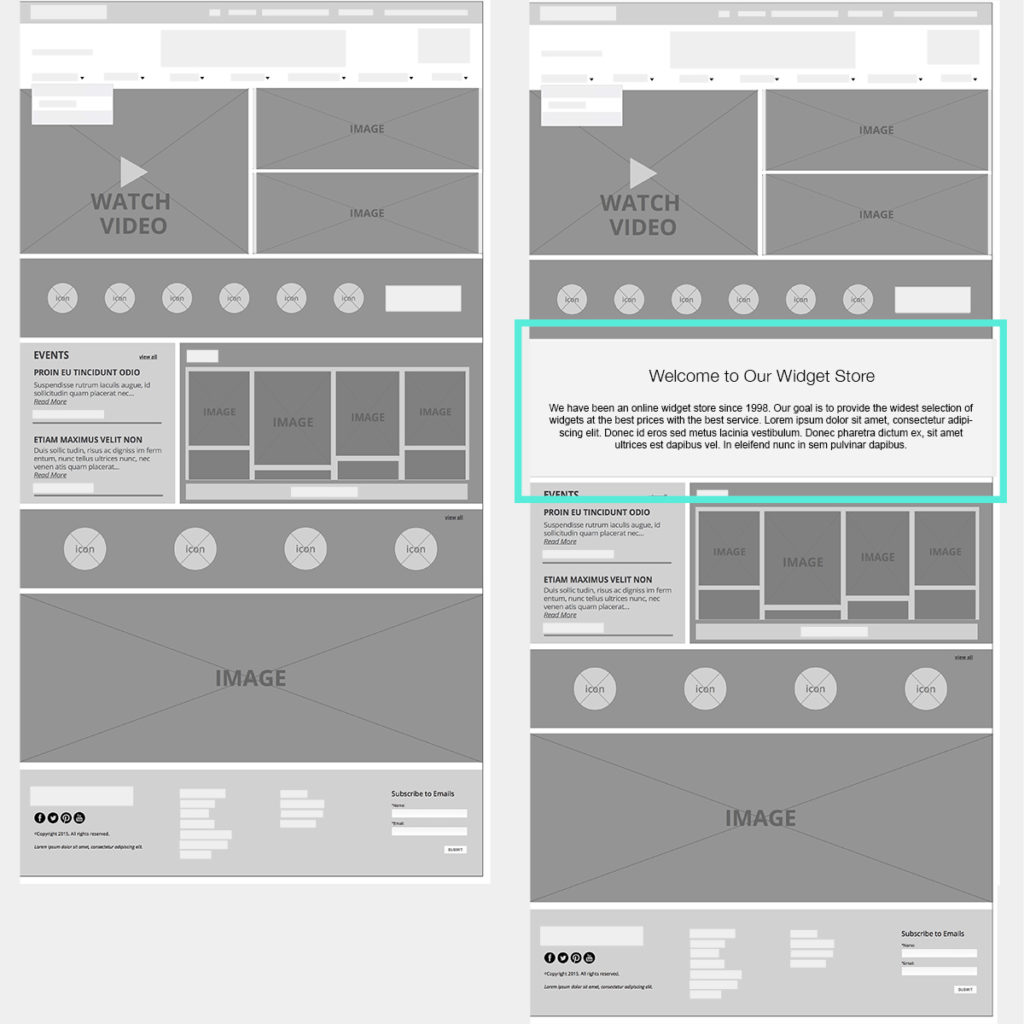Business owners very often get caught up in worrying about how their website looks. A compelling, professional aesthetic is indeed crucial to the effectiveness of a website, but if no one ever finds your site, then what return did you get on that design investment?
That’s why I want to talk about the importance of search engine optimization (SEO) as it pertains to web design projects.
My goal in this article is to convince you that paying attention to, and investing in, good web design alone will not serve your business well.
I will cover several arguments for incorporating SEO into a website design project from the beginning, including:
- How “good” design (by itself) can actually hurt you
- Why it is more expensive to “SEO” a site later
- What the “element of intent” is and why it is so important
So let’s get to it!
Reason #1: “Good” Design (By Itself) Can Hurt You
You might think, “I’m sure my web designer will build my new site according to SEO best practices. Why wouldn’t they?” Sadly, that is NOT a safe assumption to make. More often than not, web designers are focused on the very thing that defines their craft—design. And nothing more.
At Pam Ann Marketing, we are frequently hired to evaluate the SEO-friendliness of a website that was created by a design agency. All too often, we find that the design team completely turned a blind eye to SEO best practices when designing the site.
Some Web Designers Truly Do NOT Care About SEO
Opinions certainly differ amongst designers about the importance of SEO. We have actually heard some web design studios state quite bluntly that, “We here at ‘X Design Firm’ are not interested in designing for Google.” But do they let their clients know that? Of course not.
We often encounter homepage designs that have… wait for it… NO WORDS. It does not take a seasoned SEO expert to know that search engines like words! Below is an actual mockup we received for a homepage that had nearly no words on it.
How would a search engine know what that site was about? It is crucial to include a text heading and at least a few sentences on the homepage of a site so that search engines like Google can understand what the site has to offer.
You can see on the right how we suggested editing this design so that it had at least a few of those handy little things we call “words.” It really did not take much to marry the SEO and design goals in this case.

Designer Apathy Can Really Hurt You
Even worse, as horrifying as this is, we frequently see designers launch a new site with a line of code that specifically prohibits search engines from indexing the site! This causes the client’s search traffic to nearly completely disappear almost overnight.
While it is appropriate to include such a tag on the draft copy of a new site while it is under construction, a designer who understands the importance of SEO would never forget to take that tag off prior to launch.
With the number of times we have seen this specific mistake happen, we can say with statistical certainty that most web designers are NOT paying attention to SEO best practices.
If You Don’t See Something, Say Something
If you do not see language about SEO in your web design contract, do not make the very unsafe assumption that “of course” the designer will create an SEO-friendly design. That assumption could put you in a position where your new site, that you just invested a lot of money in, is even LESS likely to get found online than the prior version. Perhaps unable to be found at all!
At the very least, have a conversation with your web design firm about the importance of SEO, and ask them to include some language in their contract about incorporating SEO best practices into the project. Also consider hiring an SEO company or consultant as a separate, objective third party to participate in the project and ensure that the new site is built as search-engine-friendly as possible.
Reason #2: It’s Expensive to “SEO It” Later
A website build or redesign is an intense process. For many business owners, it can be both expensive and exhausting. For budgetary (and sanity) reasons, it may be tempting to put off SEO efforts for later. We often hear clients say, “We just want to get this new website finished. We can ‘SEO it’ later.”
Assuming that the designer does not make major blunders like the ones noted above, it may technically be true that you have the option to “SEO it” later; however, that could lead to a lot more incurred cost in the long run than if SEO was “baked in” to the new site from the get-go.
Building a website is like building a house. You would not say, “Let’s just get this house built and then we will call the architect in afterward to design it correctly later.” If you did do that, you would end up spending a lot of time and money tearing down walls and rebuilding things in a different way—things that could have just been built that way in the first place. The importance of SEO to web design is akin to the importance of having an architect properly design the structure of a house prior to the house being built.
If you intend to spend money on SEO eventually, you might as well spend it now. It will save you in the long run, and you will start to benefit from that investment right away, instead of at some undetermined point in time later.
Reason #3: The Element of Intent
I truly believe that there is no channel in digital marketing as powerful as the search engine. When a user opens up a search engine and types something in, they are performing that search because they want or need something now or soon. A search engine user typically has a “high intent to buy,” as compared to users that are just hanging out on other platforms or websites.
While other forms of digital marketing such as Facebook ads or banner ads have incredibly effective targeting methods, those targeting options only make sure that you get in front of the right person. It is not necessarily the right TIME that they need your product or service. When you get in front of users on search engines, you are getting in front of the right person at the right time. The importance of SEO usually becomes pretty clear when I explain the element of intent to business owners in that way.
If you are investing in a new website design, why not extend that investment a bit and take advantage of the most powerful digital marketing channel available to you? A website build or redesign is the absolute perfect opportunity to add some SEO-friendliness to your site and get in front of those people that are looking for your products and services right now!
Are You Convinced Yet of the Importance of SEO?
The TL;DR (too long, didn’t read) version of this article is that although good design is indeed important, if you focus ONLY on design, you can end up wasting (a lot of) money and missing out on opportunities to capture users that are actively looking to buy your products or services. The importance of SEO for website and business success is too great to turn a blind eye to during the website design process.
About the Author
 Pam Ann Aungst, M.B.A., President of Pam Ann Marketing, LLC and founder of Stealth™ Search and Analytics, is widely recognized as an expert in search engine optimization (SEO), pay-per-click advertising (PPC), and digital analytics.
Pam Ann Aungst, M.B.A., President of Pam Ann Marketing, LLC and founder of Stealth™ Search and Analytics, is widely recognized as an expert in search engine optimization (SEO), pay-per-click advertising (PPC), and digital analytics.
A self-proclaimed “geek,” Pam began studying computer programming at 6 years old, started creating websites in 1997 and has been working professionally in the field of e-commerce since 2005. Referred to by Sprout Social as a “Twitter Success Story,” she harnessed the power of social media to launch her own agency in 2011.
Pam has been interviewed by publications such as Internet Retailer magazine and CBS Small Business Pulse. She guest-lectures at prestigious universities such as NYU and frequently travels around the country giving talks at industry conferences. Pam has been honored with several awards for her small business leadership and non-profit advocacy work, including being named one of “Jersey’s Best Marcom Professionals Under 40.”
Pam holds an M.B.A. in Marketing from Regis University, where she learned the cornerstones of traditional marketing strategy. She now combines that with her more than 12 years of professional experience to help established companies and “household name” brands take their traffic-driving and analytics strategies to the next level.